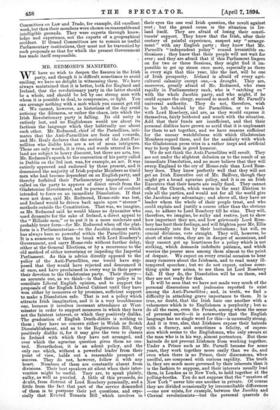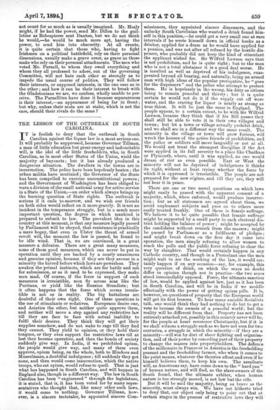MR. REDMOND'S MANIFESTO.
WE have no wish to deepen the fissures in the Irish party, and though it is difficult sometimes to avoid smiling, we have no delight in witnessing them. We have always maintained that it is better, both for England and Ireland, that the revolutionary party in the latter should be a whole, and should be led by one strong man with whom it is possible to deal, to compromise, or fight. You can arrange nothing with a mob which you cannot get rid of. We cannot, however, as historians of the day avoid noticing the dilemma, or rather the chaos, into which the Irish Revolutionary party is falling. Its old unity is entirely lost, and no Englishman would use about its factions the language which they habitually use about each other. Mr. Redmond, chief of the Parnellites, inti- mates that the Anti-Parnellites are fools and cowards, and Mr. Healy declares that the section of the Anti-Par- nellites who dislike him are a set of mean intriguers. These are only words, it is true, and words uttered in Ire- land are subject to heavy discount, but there are acts, too. Mr. Redmond's speech to the convention of his party called in Dublin on the 3rd inst. was, for example, an act. It was entirely approved and endorsed by those present, and it denounced the majority of Irish popular Members as timid men who had become dependent on an English party, and thereby forfeited their Parliamentary importance. It called on the party to approve of direct revolt from the Gladstonian Government, and to pursue a line of conduct intended to force on an immediate Dissolution. If that were not done, said Mr. Redmond, Home-rule was lost, and Ireland would be driven back again upon " sterner " methods outside the Constitution. That was, we imagine, as Mr. Redmond said he would blame no dynamiter who used dynamite for the sake of Ireland, a direct appeal to the "Hillside men," or to put it in a more moderate and probably truer form—for Mr. Redmond when off the plat- form is a Parliamentarian—to the Jacobin element which has always been so powerful within the Parnellite party. It is a summons to them to break with Lord Rosebery's Government, and carry Home-rule without further delay, either at the General Elections, or by a recurrence to the old method of either terrorising or impeding the Imperial Parliament. As this is advice directly opposed to the policy of the Anti-Parnellites, one would have sup- posed that they would have rejected and denounced it at once, and, have proclaimed in every way in their power their devotion to the Gladstonian party. Their theory— an accurate one, as we think—is that their policy is to conciliate Liberal English opinion, and to support the proposals of the English Liberal Cabinet until they have won either by measures or by promises, sufficient support to make a Dissolution safe. That is not a policy which attracts Irish imagination, and it is a very troublesome one, because it involves incessant attendance at West- minster in order to support measures in which they have not the faintest interest, or which they positively dislike. The graduation of English Death-duties is nothing to them ; they have no concern either in Welsh or Scotch Disestablishment, and as to the Registration Bill, they positively dislike it, for it may give the vote to classes in Ireland with which they have not arranged, and over which the agrarian question gives them no con- trol. Nevertheless, it is an adroit policy, and the only one which, without a powerful leader from their point of view, holds out a reasonable prospect of success. They do not, however, follow it with any heart. Numbers of them are constantly absent from divisions. Their best speakers sit silent when their inter- vention might be useful. Tney are, to speak plainly, sulky, as well as puzzled. A little of this proceeds, no dcubt, from distrust of Lord Roseberv personally, and a little from the fact that part of the service demanded of them is to postpone their pet questions, and espe- cially that Evicted Tenants Bill which involves in their eyes the one real Irish question, the revolt against rent ; but the grand cause is the situation in Ire- land itself. They are afraid of losing their consti- tuents' support. They know that the Irish, after their century of painful experience, suspect any " arrange- ment " with any English party ; they know that Mr. Parnell's "independent policy" roused irresistible en- thusiasm; they know that their people will not wait for ever ; and they are afraid that if this Parliament lingers on for two or three Sessions, they might find it im- possible to get up steam once more, especially as there is every sign that this year, like the last, will be one of Irish prosperity. Ireland is afraid of every agri- cultural calamity except one,—a drought. They are, moreover, greatly afraid of Mr. Redmond, who rises rapidly in Parliamentary rank, who is "catching on" with the whole Jacobin party, and. who might, if he could square the clergy, succeed to much of Mr. Parnell's universal authority. They do not, therefore, wish to be left behind by the Parnellites, or to break with Lord Rosebery, and are, as they would. express it themselves, fairly bothered. and wroth with the situation. Add that their funds are insufficient, and that their personal dislikes have grown so acrid. that it is unpleasant for them to act together, and we have reasons sufficient for the uneasy watchfulness with which Gladstonian Members regard them, and for the assiduity with which the Gladstonian press tries in a rather inept and artificial way to keep them in good humour.
We do not think the Anti-Parnellites will revolt. They are not under the slightest delusion as to the result of an immediate Dissolution, and no more believe that they will sweep England. to the cry of Home-rule than Lord Rose- bery does. They know perfectly well that they will not get an Irish Executive out of Mr. Balfour, though they might get a broad agrarian policy, and it is on an Irish Executive that their hearts are really fixed. They cannot offend the Church, which wants in the next Election to rule all the parties, and would not for all the world give the Jacobins any advantage ; and. above all, they have no leader whom the whole of their people trust, and who could explain and justify a course other than the obvious one, to adhere to Lord. Rosebery till he wins. They will, therefore, we imagine, be sulky and restive, just to show how important they are, and. how grievously Lord Rose- bery has hurt their feelings, and will frighten poor Mr. Ellis occasionally into fits by their hesitations ; but will, on crucial divisions, vote straight. They will, however, be short of nine votes, they are in danger of secessions, and they cannot get up heartiness for a policy which is not striking, which demands indefinite patience, and which worries the poorer men among them almost to the point of despair. We expect on every crucial occasion to hear many rumours about the Irishmen, and to read many ill- tempered speeches ; but we do not expect, unless some- thing quite new arises, to see them let Lord. Rosebery fall. If they do, the Dissolution will be on them, and they are not ready for that.
It will be seen that we have not made very much of the personal dissensions and. jealousies reported to exist among the Anti-Parnellites ; and, in truth, we find. a difficulty in attaching grave importance to them. It is true, no doubt, that the Irish hate one another with a vehemence which is to Englishmen a perplexity ; but so do all the races, even the French, among whom the sense of personal merit—it is noteworthy that the English language his no single word for this—is unusually strong. And it is true, also, that Irishmen expose their hatreds with a fluency, and sometimes a felicity, of expres- sion which seems to the Englishman, who only swears at the man who is in his way, almost portentous. But these hatreds do not prevent Irishmen from working together. Under a Prince such as Mr. Parnell became for some years, they work together more easily than we do, and. even when there is no Prince, their dissensions, when needful, are composed with curious rapidity. The truth is, they are much more governed by their interests than it is the fashion to suppose, and their interests usually lead them, in London as in New York, to hold together at the polling-booths. You do not suppose that the "masters of New York" never bite one another in private. Of course they are divided occasionally by irreconciliable differences —one now exists, for example, between the Jacobin and Clerical revolutionists—but the personal quarrels do not count for so much as is usually imagined. Mr. Healy might, if he had the power, send Mr. Dillon to the guil- lotine as Robespierre sent Danton, but we do not think he would,—he would be much more apt, having the power, to send him into obscurity. At all events, it is quite certain that those who, having to fight Irishmen on a political battlefield, rely on their personal dissensions, usually make a grave error, as grave as those make who rely on their personal attachments. The men who voted Mr. Parnell, to whom they owed. everything and whom they all professed to adore, out of the governing Committee, will not hate each other so strongly as to impede the usual course of politics. They will follow their interests, or supposed. interests, in the one case as in the other ; and how it can be their interest to break with the Gladstonians we are, we confess, wholly unable to per- ceive. The Parnellites have done it because separateness is their interest,—an appearance of being far in front ; but why, unless their seats are at stake, which is not the case, should their rivals do the same ?







































 Previous page
Previous page